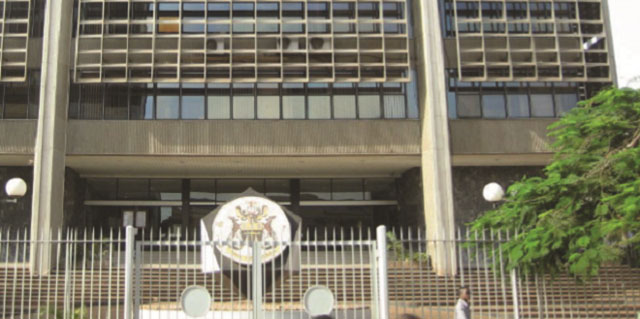
Kampala — The Central Bank yesterday suffered a mysterious failure of its real-time gross settlements (RTGS) system, forcing the Governor to suspend processing for large payments for most of the day and institute an investigation into the incident.
There were frantic attempts to fix what BoU managers called “normal system hiccup” as BoU senior managers “fidgeted” with large cash transactions that needed urgent, safe, secure and real-time clearance. They tried to revert to manual processing for large payments but didn’t succeed
The governor, Mr Emmanuel Tumusiime-Mutebile, and his team, came under pressure to explain what sources called “the collapse” of the Uganda National Interbank Settlement (UNIS) System, also known as, the BoU Real Time Gross Settlement (RTGS) System.
Questions
Sources at BoU and Treasury told Daily Monitor last evening that the collapse of the payment system puzzled BoU officials and the governor has tasked the IT team at BoU and the head of security to investigate what happened. The disruption mainly affected both incoming and outgoing RTGS flows and clearing files.
This, according to a senior manager at BoU and another source at a major financial institution in the country, “is an industry-wide issue and is still persisting and unfortunately, until BoU sorts out the system, payments/receipts cannot be effected.”
The BoU director for communications, Ms Charity Mugumya, last evening confirmed the incident in an email to Daily Monitor and explained that the issue has since been resolved.
“It is true that the RTGS had some temporal challenges but they have now been resolved and the system is operating normally,” Ms Mugumya said.
According to authorities at the Uganda Bankers Association (UBA), RTGS are specialist fund transfer systems where transfer of money or securities take place from one bank to another on a “real time” and on “gross” basis.
Settlement in “real time” means payment transaction is not subjected to any waiting period. The transactions are settled as soon as they are processed. “Gross settlement” means the transaction is settled on one-to-one basis without bundling or netting with any other transaction. Once processed, payments are final and irrevocable.
Effect
Although BoU personnel, UBA and senior officials in the Ministry of Finance passed the incident off as a largely technical issue, the RTGS collapse disrupted the financial sector for a whole day as BoU technical team struggled to avert catastrophic consequences for the country’s economy.
But sources told Daily Monitor that the technical hitch prevented commercial banks and government departments from transacting business as commercial banks and other stakeholders put pressure on the governor and his team to explain what happened.
The affected payments included government disbursements and inter-bank financial transactions, many requiring clearance through intermediary financial institutions, with ripple effects on pay settlements among countless corporate clients.
The executive director, banks supervision, Dr Tumubweine Twinemanzi, yesterday ruled out any possibility of hacking and described the collapse of the RTGS at BoU as “normal system hiccups”.
“RTGS is a digital system for exchange of payments… when your computer misbehaves, do you immediately assume it has been hacked [into] or you ask when was the anti-virus last updated or Operating System Patching done?” Dr Twinemanzi asked.
Dr Twinemanzi was last evening responding to fears that the system failure could have been a handiwork of a hacker.
Finance minister Matia Kasaija and Secretary to the Treasury said they were not aware of the system failure at BoU and promised to cross-check with the governor today.
Experts speak out
Mr Fred Muhumuza, an economist, yesterday explained that the disruption in RTGS system depends on many things, “you wouldn’t know why it was disrupted, possibly, BoU was upgrading the system and this case, they might have communicated to those people or it could be coming from outside a system where there are service providers with Internet links to the system.”
“That can be a big disruption to the economy and [the system failure at BoU] could have disrupted many business transactions, particularly people who had payments to make or receive because the RTGS is a big money mover,” Dr Muhumuza explained.
“A day of disruption can mean a lot to business, including government itself… . I hope that was not sabotage of any investments. But it could have been a hiccup or anything but I hope nobody hacked into the BoU system,” he said.
He added: “Those are the stories that will come later, for now, we don’t want to speculate on the central bank because it has been hit already because of the many scandals. For now, one can only discuss the implication of the interruption in the RTGS system and how this has affected the economy, payments of taxes to URA and other business transactions.”
Mr Wilbrod Owor, the UBA executive director, said they have a committee in charge of operations that works with BoU in case of such matters. Asked whether he was aware of the RTGS system failure at BoU, he said he was not in the office and needed to contact the head of the operations committee for the updates.
About the BoU Real Time Gross Settlement System
Use. The advanced interbank electronic payment system facilitates safe, secure and real-time transmission of high value funds between accounts in different financial institutions. It was implemented in February 2005, and was upgraded from a client/server based model to a web-based model in August 2009. The UNIS System participant base was expanded from commercial banks to include Non-Bank Financial Institutions.
The system has, however, improved efficiency in payment systems by mitigating settlement risk and eradicating time lag for settling high-value and time critical payments. They include clearing house balances, interbank transfers, government securities and money market transactions.
Currently, there are 26 registered UNIS System participants. Turnaround time for a transaction is T+0 (instantaneous) with a maximum time lag of two hours. The average daily processing involves 1200 transactions with a value of around Shs263 billion.
To date, about 85 per cent of large value and time critical payment transactions pass through the RTGS system, leaving only 15 per cent to pass through the clearing system
SOURCE:allAfrica




